Dell PowerEdge T630 review (13th Generation)
Cores galore and plenty more as Dell’s 2014 PowerEdge T630 debuts Intel’s new E5-2600 v3 Xeons
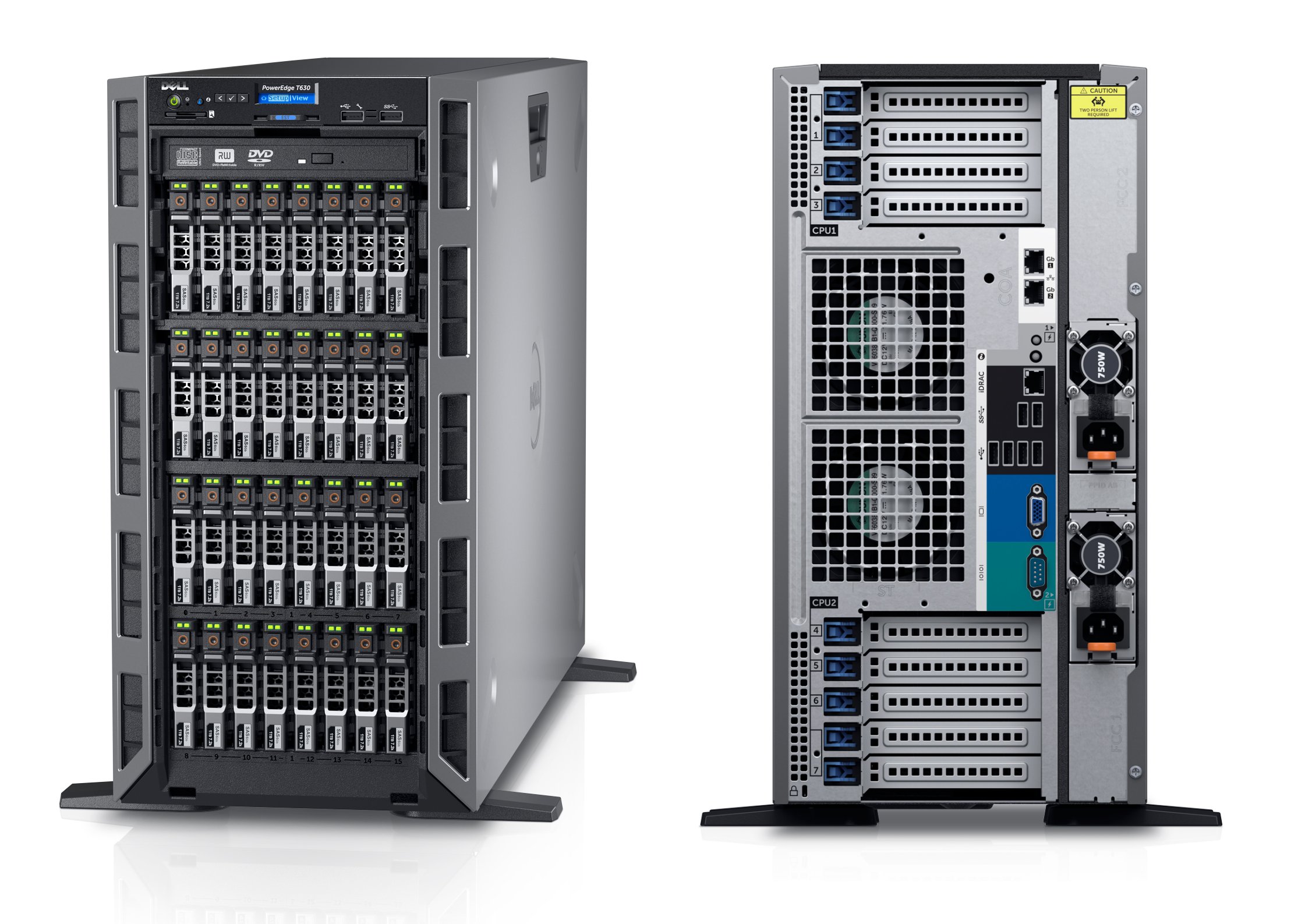

The T630 is an ideal choice for SMBs wanting a floor-standing powerhouse. The new E5-2600 v3 Xeons and DDR4 memory will give a big performance boost and it has the best storage potential for its size.
-
+
Huge CPU core count; Massive storage potential; Superb build quality; Extensive management tools
-
-
Top bin Xeons are pricey

The wait for Intel's Haswell-EP' Xeons is over as Dell's 13th generation PowerEdge servers have landed in the IT Pro labs. In this exclusive review we delve deeper into its PowerEdge T630 pedestal server, which is powered by dual E5-2600 v3 processors, DDR4 memory and a whole lot more.
More evolution that revolution, the T630 doesn't introduce the same number of features we saw in Dell's 12th Generation T620. Nevertheless, the new Xeons boost its core count massively, storage options are more varied and it introduces plenty of new server management tools.
The T630 targets SMBs looking for a general purpose floor-stander capable of running anything they can throw at it. Typical apps include mail, messaging, file, print and web services, databases and OLTP while healthcare and educational establishments might fancy it as a big record repository.
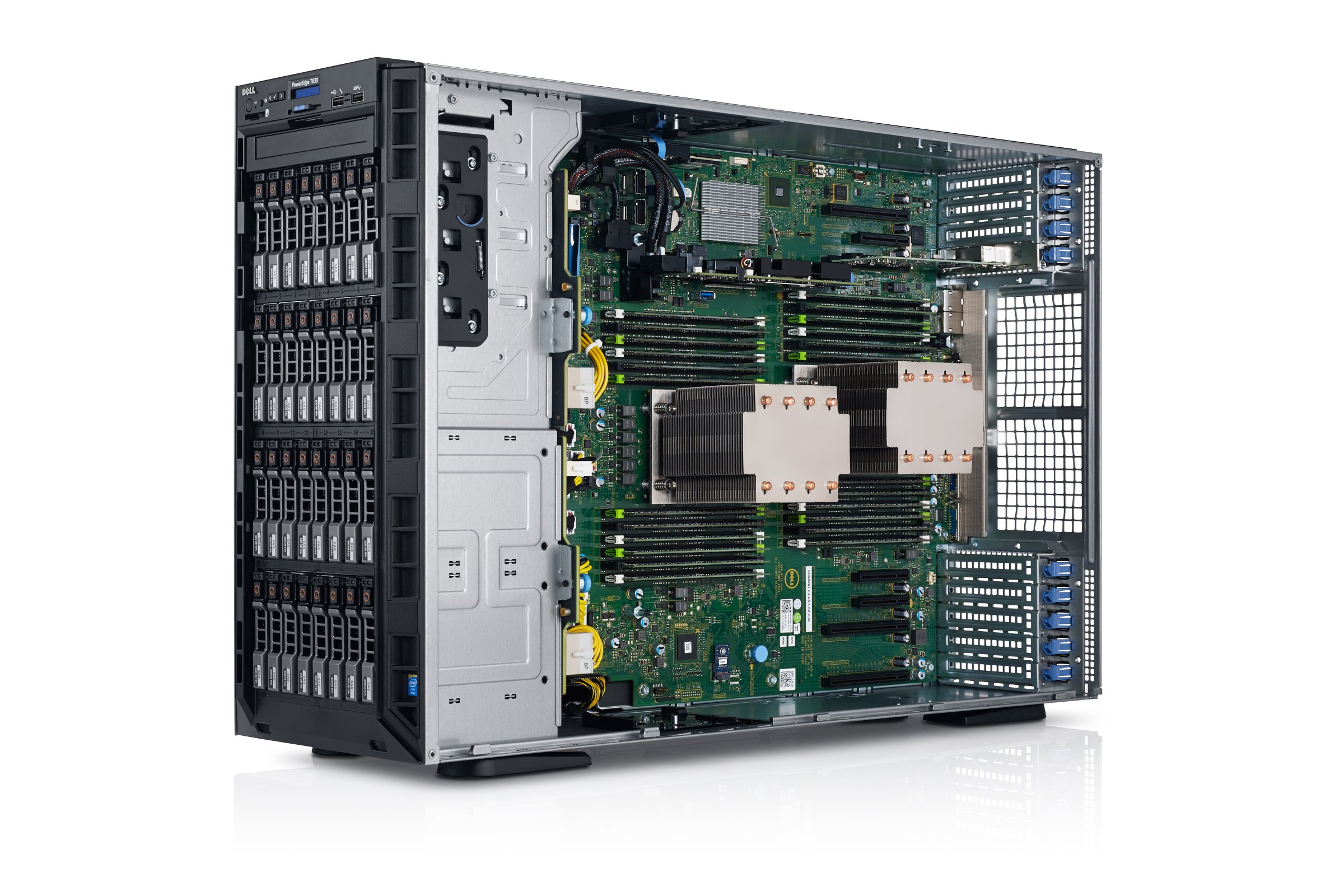
The T630 is very well designed internally and provides easy access to all key components
Xeon Power
The E5-2600 v3 family represents an Intel tock' development phase. It uses the same 22nm fab process as the E5-2600 v2 Xeons but plugs in to a new 2,011-pin R3 socket.
QPI speeds have been boosted to 9.6GT/sec and the new server CPU family comprises 19 members. The HCC (high core count) group tops out with the mighty 18-core 2.3GHz E5-2699 v3 which has a 45MB L3 cache and supports 2,133MHz DDR4 memory.
Between the Advanced, Standard and Basic groups you have choices from 6 to 12 cores and various options for 1,600MHz to 2,133MHz DDR4 support along with 6.4GT/sec up to 9.6GT/sec QPI speeds.
The T630 on review came with a pair of 14-core 2.3GHz E5-2695 v3 Xeons delivering a remarkable 56 logical cores. The price we've shown initially seems high but these top end CPUs each cost 2,785.
Combining this with the 1,182 for the 64GB of 1.2V 2,133MHz DDR4 memory accounts for 70 per cent of the total price. Dell expects the 10-core 2.3GHz E5-2650 v3 to be more mainstream and prices for these are a much lower 1,286.
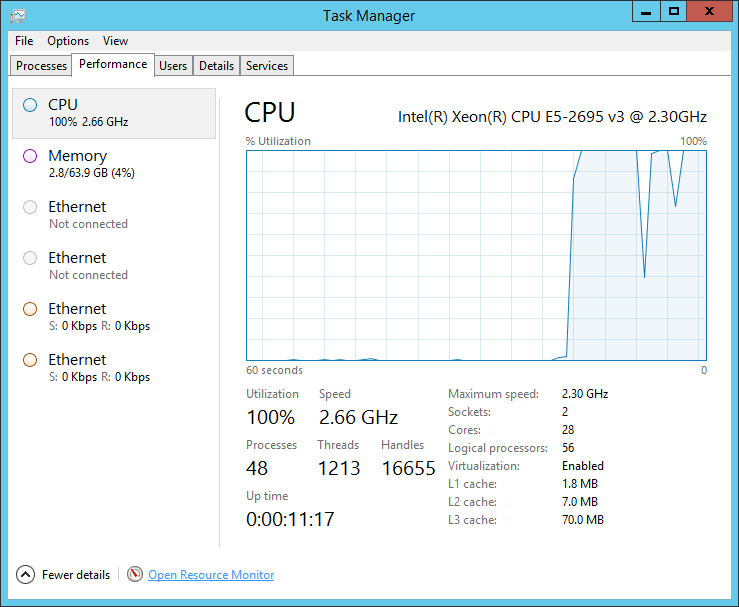
The 2.3GHz E5-2695 v3 Xeons in the review system deliver an impressive 56 logical cores
Faster storage
The T630 has room for up to 32 SFF drives in two front bays the same as the T620 but storage options are more versatile. LFF drive support goes from 12 to 18 or you can have 8 LFF drives and four 5.25in. peripheral bays.
Drive configurations must be selected at point of sale and Dell also offers a single 16 SFF bay. The T630 can handle up to four PCI-e SSDs which can be mixed with 8 LFF or 16 SFF drive bays.
RAID options start with the embedded PERC S130 and software managed RAID0, 1 and 5 arrays. The new Intel chipset and its enhanced SATA features allow the S130 to support 8 hot-swap SATA drives twice that of the T620.
The PERC H730P RAID card brings in 12Gb/sec SAS support while on-board cache memory is doubled to 2GB of DDR3. Along with all the usual RAID suspects, it supports LSI's CacheCade which, as we found in our R720 review, can boost I/O performance with SSDs massively.
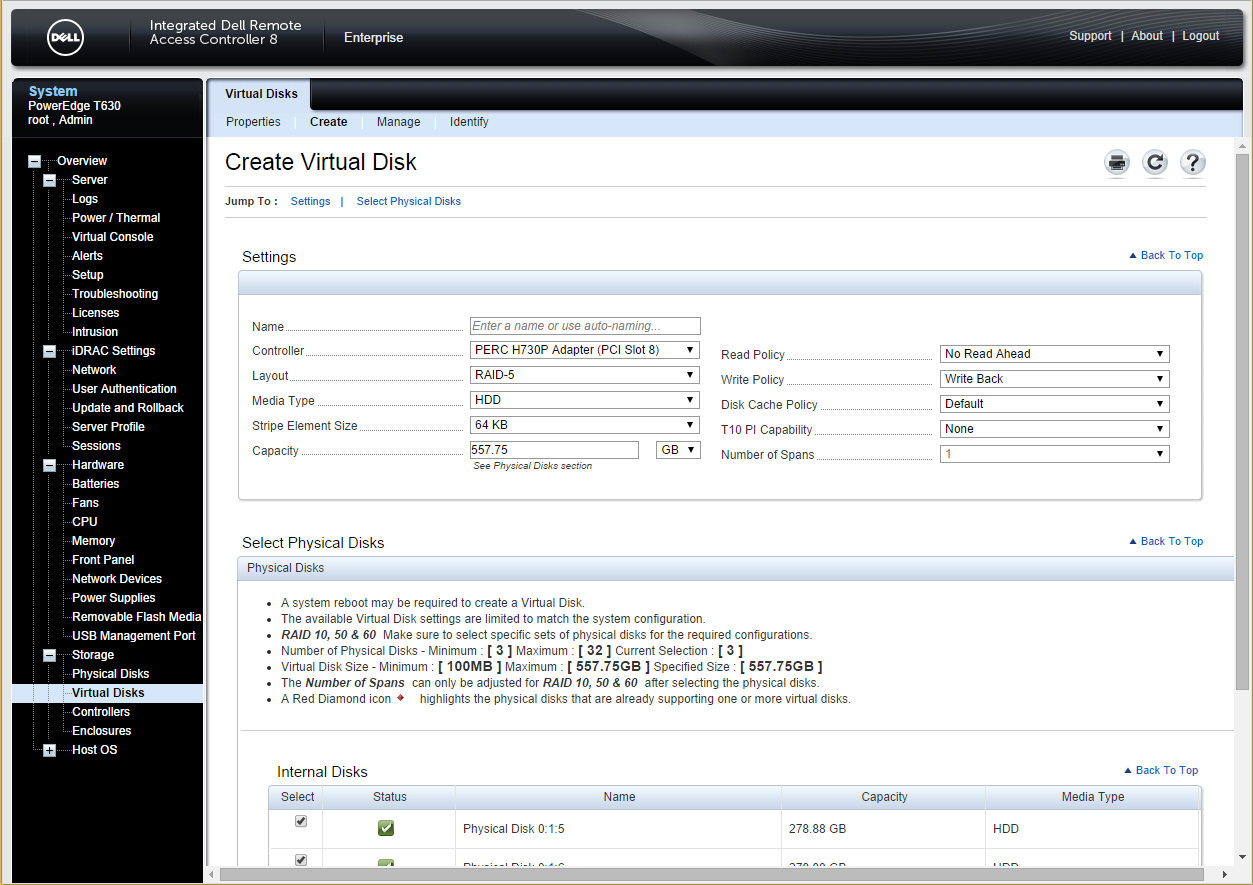
Dell's latest iDRAC8 lets you access the RAID card and drives directly for array creation
Power to the server
The review system had a pair of Platinum 750W hot-plug PSUs but you can also choose from 495W, 1100W and 1600W Platinum or a 750W Titanium PSUs. There's also an 1100W DC version for the telecom market and all share a common form factor.
The new Xeons continue Intel's mantra of more cores for less power. The 2.3GHz CPUs in the review system have a 120W TDP and we measured the review system drawing only 120W with Window Server 2012 R2 in idle and peaking at 390W under maximum load.
This compares well with the T620 we had on review. Its modest 8-core 2GHz E5-2650 Xeons and 64GB of DDR3 drew 126W in idle and 278W under peak load.
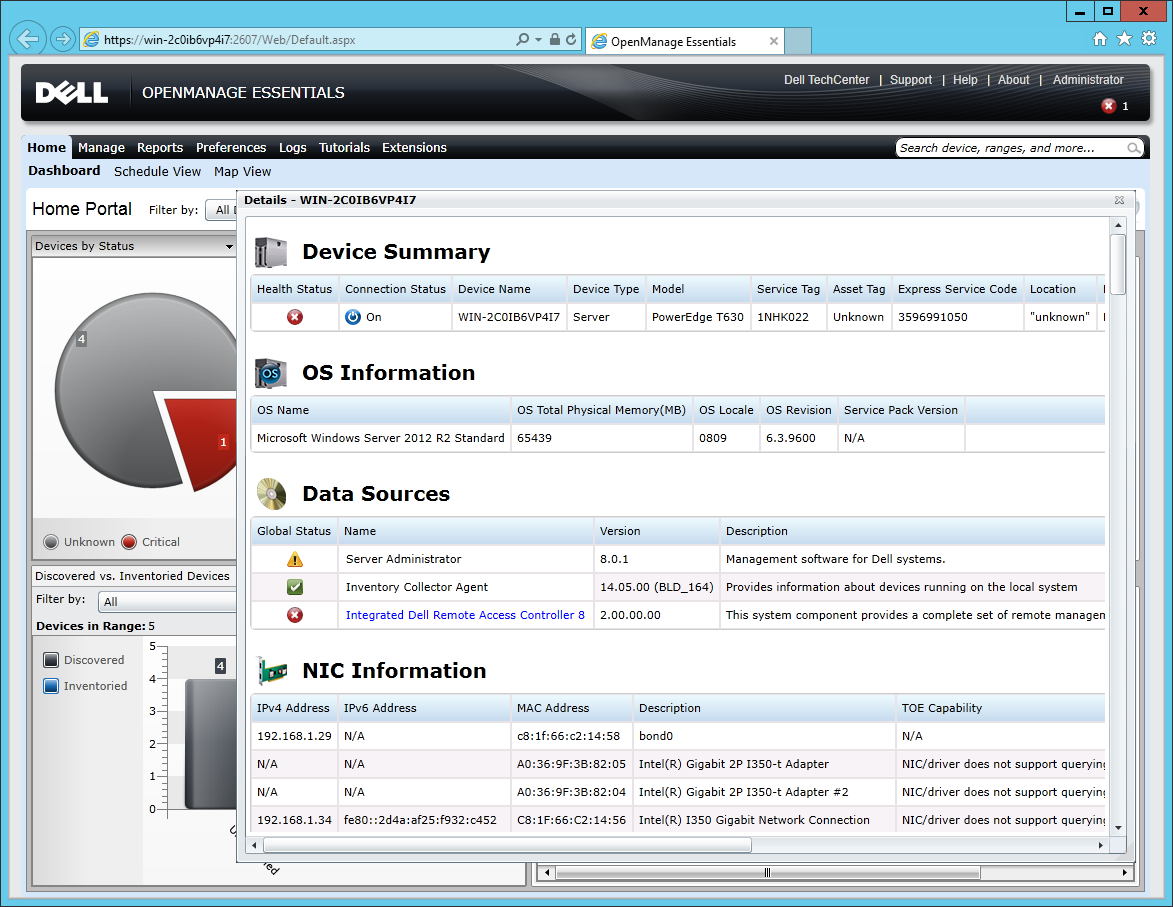
Dell's free OpenManage Essentials provides plenty of alerting tools and agent-less server management
Cooling and management
Default configurations come with two fans at the back of the chassis which we found were virtually silent. You must order an extra four fan module if you want fan redundancy, are fitting GPGPU cards or PCI-e SSDs or have 18 LFF drives.
Support staff will like the faster boot times with Dell claiming this can be as low as one minute. Memory capacities will affect this and we timed our server at 86 seconds to reach Windows Server 2012 R2 boot-up and 112 seconds in total to reach the login screen.
Dell's new iDRAC8 gets a dedicated Gigabit port and provides fully automated management plus rapid configuration deployments using DHCP, XML or template files. We found its web interface intuitive and appreciated the direct access to the PERC RAID card and attached drives plus the enhanced power management and capping features.
Agent free monitoring is available using Dell's OpenManage Essentials which provides SNMP and WMI based device discovery and inventory tools. It links up directly with all iDRAC cards and provides full monitoring and alerting from a single console.
Conclusion
Dual E5-2600 v3 Xeons, DDR4 memory and the best storage potential makes the PowerEdge T630 a highly versatile server. Capable of handling a wide range of workloads, it's an ideal choice for SMBs looking for high expansion and growth potential.
Verdict
The T630 is an ideal choice for SMBs wanting a floor-standing powerhouse. The new E5-2600 v3 Xeons and DDR4 memory will give a big performance boost and it has the best storage potential for its size.
Chassis: Pedestal
CPU: 2 x 2.3GHz Xeon E5-2695 v3 (14-core)
Memory: 64GB DDR4 2,133MHz 1.2V (max 768GB)
Storage: 2 x 300GB SAS 10K SFF hard disks (max 32)
RAID: Dell PERC H730P 12Gbps SAS with 2GB NVRAM cache and BBU
Array support: Array support: RAID0, 1, 10, 5, 6, 50, 60
Network: 2 x Gigabit LOM
Expansion: 5 x PCI-e 3.0, 2 x PCI-e 2.0 slots
Power: 2 x 750W 80Plus Platinum hot-swap PSUs
Management: Dell iDRAC8 with Enterprise upgrade
Warranty: 3yrs on-site NBD
Get the ITPro daily newsletter
Sign up today and you will receive a free copy of our Future Focus 2025 report - the leading guidance on AI, cybersecurity and other IT challenges as per 700+ senior executives
Dave is an IT consultant and freelance journalist specialising in hands-on reviews of computer networking products covering all market sectors from small businesses to enterprises. Founder of Binary Testing Ltd – the UK’s premier independent network testing laboratory - Dave has over 45 years of experience in the IT industry.
Dave has produced many thousands of in-depth business networking product reviews from his lab which have been reproduced globally. Writing for ITPro and its sister title, PC Pro, he covers all areas of business IT infrastructure, including servers, storage, network security, data protection, cloud, infrastructure and services.
-
 ‘Phishing kits are a force multiplier': Cheap cyber crime kits can be bought on the dark web for less than $25 – and experts warn it’s lowering the barrier of entry for amateur hackers
‘Phishing kits are a force multiplier': Cheap cyber crime kits can be bought on the dark web for less than $25 – and experts warn it’s lowering the barrier of entry for amateur hackersNews Research from NordVPN shows phishing kits are now widely available on the dark web and via messaging apps like Telegram, and are often selling for less than $25.
By Emma Woollacott Published
-
 Redis unveils new tools for developers working on AI applications
Redis unveils new tools for developers working on AI applicationsNews Redis has announced new tools aimed at making it easier for AI developers to build applications and optimize large language model (LLM) outputs.
By Ross Kelly Published
-
 Google layoffs continue with "hundreds" cut from Chrome, Android, and Pixel teams
Google layoffs continue with "hundreds" cut from Chrome, Android, and Pixel teamsNews The tech giant's efficiency drive enters a third year with devices teams the latest target
By Bobby Hellard Published